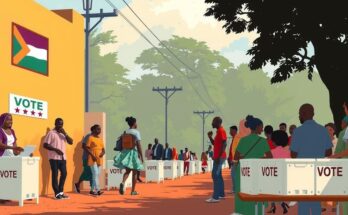In the recent vice-presidential debate, Senator JD Vance outperformed Governor Tim Walz, effectively challenging Vice President Kamala Harris’s record while facing biased questioning from the moderators. The debate’s outcomes may bolster the Trump-Vance campaign amid a backdrop of dissatisfaction with the Biden administration’s responses to significant national issues.
The recent vice-presidential debate held on October 1, featuring Ohio Senator JD Vance and Minnesota Governor Tim Walz, highlighted the contrasting performance of the two candidates. Senator Vance emerged as the clear victor, displaying poise, factual accuracy, and analytical skill. On the other hand, Governor Walz faced the challenging task of defending Vice President Kamala Harris amidst her perceived failings and the difficulties posed by the Biden administration’s policies. Moderators Nora O’Donnell and Margaret Brennan exhibited a noticeable bias, particularly targeting Senator Vance while neglecting pertinent issues such as the administration’s response to Hurricane Helene, international crises, and domestic crime. Instead, they focused on topics like climate change and abortion, likely seeking to corner Vance with issues they believed would be more favorable to their agenda. Walz’s poor performance contrasted sharply with Vance’s articulate responses, which allowed him to dismiss unfounded criticisms regarding his temperament. Additionally, it became evident that former President Donald Trump had made a strategic choice in selecting Vance, as he seemed adept at communicating the Make America Great Again principles effectively—a skill that has garnered significant attention. Vice President Harris’s choice of Governor Walz as a debate partner appeared to stem from her desire to avoid overshadowing and to appear competent by comparison. However, as the campaign progresses, the negative perception of Harris and Walz is expected to continue to decline, further complicated by ongoing crises and criticisms regarding their handling of significant national issues.
The context of this article revolves around the political landscape leading up to the upcoming election, particularly the dynamics between the Biden-Harris administration and their challengers. The vice-presidential debate serves as a critical focal point in the campaign, revealing the strengths and weaknesses of the candidates while also highlighting the media’s role in shaping public perception. Given the pressing issues facing the administration, such as natural disasters and foreign conflicts, the efficacy of the candidates in addressing these topics becomes paramount in influencing voter sentiment.
In conclusion, the vice-presidential debate showcased a stark contrast between Senator Vance and Governor Walz, with Vance securing a decisive victory despite the moderators’ biased questioning. This debate could potentially shift momentum in favor of the Trump-Vance ticket, especially as public dissatisfaction with the Harris-Walz duo continues to grow amid ongoing national crises. It is anticipated that the erosion of support for the current administration will persist as the election approaches, reflecting broader voter concerns.
Original Source: www.foxnews.com




